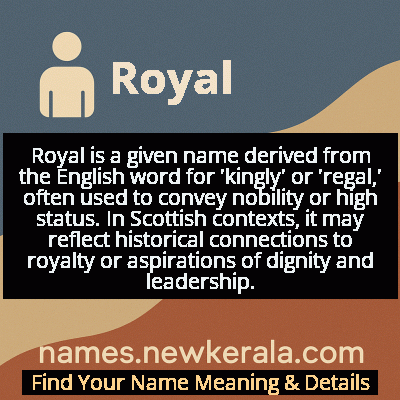Royal Name Meaning & Details
Origin, Popularity, Numerology Analysis & Name Meaning of Royal
Discover the origin, meaning, and cultural significance of the name ROYAL. Delve into its historical roots and explore the lasting impact it has had on communities and traditions.
Name
Royal
Gender
Male
Origin
Scottish
Lucky Number
8
Meaning of the Name - Royal
Royal is a given name derived from the English word for 'kingly' or 'regal,' often used to convey nobility or high status. In Scottish contexts, it may reflect historical connections to royalty or aspirations of dignity and leadership.
Royal - Complete Numerology Analysis
Your Numerology Number
Based on Pythagorean Numerology System
Ruling Planet
Saturn
Positive Nature
Ambitious, efficient, realistic, and authoritative.
Negative Traits
Materialistic, stressed, confrontational, and can be overly ambitious.
Lucky Colours
Dark blue, black.
Lucky Days
Saturday.
Lucky Stones
Blue sapphire, amethyst.
Harmony Numbers
2, 4, 6.
Best Suited Professions
Business leaders, managers, financial services, law enforcement.
What People Like About You
Leadership, determination, organizational skills.
Famous People Named Royal
Royal D. S. Horsburgh
Scottish Physician and Botanist
Renowned for his contributions to Scottish botany and medical research
Royal Cortissoz
Art Critic and Historian
Influential American art critic for the New York Herald Tribune
Royal R. Riddick
American Football Player
Professional football player for the Detroit Lions
Royal Raymond Rife
American Inventor and Researcher
Developer of the Rife machine and work in microbiology
Name Variations & International Equivalents
Click on blue names to explore their detailed meanings. Gray names with will be available soon.
Cultural & Historical Significance
Extended Personality Analysis
Individuals named Royal typically exhibit a compelling blend of traditional values and contemporary confidence that reflects both the Scottish heritage and modern appeal of their name. They often demonstrate natural leadership abilities, carrying themselves with a dignified presence that commands respect without being authoritarian. The original meaning of 'red-haired' translates psychologically into passionate, energetic personalities with strong convictions and creative drive. These individuals tend to be highly determined, setting ambitious goals and pursuing them with unwavering focus—qualities that served their Scottish ancestors well in challenging environments. Royals are frequently characterized by their loyalty and protective nature, echoing the clan mentality of their heritage where family and community bonds were paramount. They possess a unique balance of fiery passion and regal composure, able to express strong emotions while maintaining overall dignity and self-control. Many Royals show exceptional resilience and adaptability, traits that mirror the historical Scottish experience of navigating changing political and cultural landscapes. Their creative thinking often combines traditional wisdom with innovative approaches, making them effective problem-solvers who honor their roots while embracing progress.
Modern Usage & Popularity
In contemporary naming practices, Royal has experienced a remarkable resurgence, transitioning from primarily a surname to an increasingly popular given name for boys. This trend reflects broader patterns in modern naming, where surname-style first names have gained significant traction. According to recent data from various national naming registries, Royal entered the top 1000 names for boys in the United States in 2013 and has shown steady growth since, with particular popularity in states with strong Scottish-American communities like North Carolina, Pennsylvania, and Michigan. The name's appeal lies in its perfect balance of traditional heritage and modern distinctiveness—it sounds both classic and contemporary. Modern parents are drawn to Royal for its strong Scottish roots, regal connotations, and relative rarity compared to more common traditional names. The name has also benefited from celebrity influence and appears in popular culture, further boosting its visibility. Interestingly, while traditionally male, there's growing interest in using Royal for girls as well, though it remains predominantly masculine. The name's versatility allows it to work well in both formal and casual contexts, making it an attractive choice for parents seeking something meaningful yet accessible in today's diverse naming landscape.
Symbolic & Spiritual Meanings
The name Royal carries profound symbolic meaning that operates on multiple interconnected levels, creating a rich tapestry of cultural and personal significance. Most evidently, it symbolizes nobility, excellence, and leadership—qualities universally associated with royalty and high achievement. This regal symbolism connects to ideals of dignity, honor, and responsibility that have characterized monarchical traditions across cultures. Simultaneously, the original Gaelic meaning of 'red' or 'red-haired' introduces powerful color symbolism: red represents passion, vitality, courage, and life force in numerous cultural traditions. In Celtic symbolism specifically, red hair was often associated with magical qualities, warrior spirit, and connection to supernatural realms. The name thus embodies a fascinating duality—the fiery, passionate energy of its Gaelic roots combined with the composed dignity of its English interpretation. This symbolic blend represents the ideal balance between passion and control, creativity and tradition, individuality and responsibility. Furthermore, as a name that bridges Scottish Gaelic heritage and English language, Royal symbolizes cultural adaptation and the successful integration of different traditions—a particularly relevant meaning in our increasingly globalized world. The name encourages bearers to honor their roots while embracing broader horizons, to maintain strong convictions while remaining open to growth and change.

